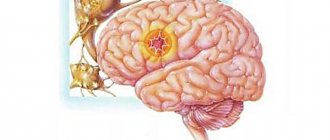What is dementia and what are its manifestations?
Dementia is the loss of cognitive, or, as experts say, cognitive abilities, that is, memory, attention, speech, spatial orientation and others.
Previously, this condition was called dementia, and the extreme degree of its manifestation - marasmus, but now these names are not used in medicine.
With dementia, cognitive abilities are permanently impaired, that is, we are not talking about a temporary deterioration in mental state, as, for example, during an acute illness. The diagnosis of dementia is established if memory and other functions are reduced for more than six months.
Some decline in memory for recent events is natural in old age, and this phenomenon is called benign forgetfulness. When impairment reaches the level of dementia, people have difficulty performing everyday tasks that were previously easy.
If normally a person can make his forgetfulness noticeable only to him, then with dementia the changes are visible first to close people, and then to everyone around him.
Senile dementia
Senile dementia is an organic mental disorder that progresses in the human body between the ages of 60 and 75 years. The growing pathological process is accompanied by impaired intelligence, confusion, weakening of memory and radical personality changes.
It is very difficult to prevent this pathology, since its main causes in most clinical pictures remain unclear. Doctors have come to the general conclusion that the disease begins with extensive damage to the brain: neurons die due to lack of nutrition, that is, the pathological process is preceded by acute oxygen starvation against the background of irreversible senile processes in the body.
Senile dementia has pronounced symptoms, although the disease begins to progress with barely noticeable memory loss . At first, the patient forgets the phone numbers and dates of birth of his relatives, but after a short period of time he no longer remembers the names of his children and grandchildren. This is a dangerous condition, which also affects orientation in space: it is best not to let the patient leave the house alone, since there is a high probability that he will not be able to find his way back.
Radical changes are observed in habits and personality: if before this was a thrifty person, then after an exacerbation of the disease he becomes a real spender who is ready to give away even his last in favor of those in need, so to speak. That is, personal qualities and priorities formed throughout life are destroyed under the influence of the disease, and the patient’s behavior becomes unpredictable for others.
It is frightening that delusional and obsessive ideas become the norm of everyday life, and the slow development of intelligence turns a once conscious and intelligent person into a small child with limited imagination and a meager vocabulary. It is almost impossible to stop this irreversible process; the only thing doctors can offer is to slow down its course.
If the patient experiences such symptoms, he is not able to recognize and accept them; But the unfavorable changes are noticed by everyone around him, who, by the way, seek medical help from qualified specialists. Diagnosis of senile dementia includes a detailed study of the brain, examination of the thyroid gland and numerous psychological tests , which allow one to assess the patient’s health status and select the most adequate treatment regimen.
Here, not only conservative therapy is important, but also some changes in the patient’s usual lifestyle. For example, the patient should not be left alone with his thoughts - he should always be surrounded by his closest relatives and loved ones. Otherwise, he himself poses a significant threat to his health, and the consequences of another attack may be the most unexpected.
The basis of drug treatment are drugs that improve cerebral circulation. They are prescribed for depression, insomnia, aggression, delusions and hallucinations, that is, directly at the stage of relapse. In general, the best therapy is the prevention of all cardiovascular diseases and disorders of the central nervous system, since patients with such diagnoses are twice as likely to suffer from senile dementia.
Dementia with Lewy bodies
Insomnia in dementia
Causes of dementia
Dementia is not the name of a specific disease. We are talking about a combination of symptoms (syndrome) that can be caused by various reasons. Only a doctor after an examination can understand which disease led to dementia.
Most often (in 2/3 of cases), dementia in older people develops due to Alzheimer's disease, in which, for reasons that are not entirely clear, nerve cells in the brain steadily die.
The second most common cause of dementia is atherosclerosis of cerebral vessels (deposition of cholesterol plaques in them), and in this case dementia is called vascular.
Alzheimer's disease and vascular dementia are incurable. If the diagnosis is correct, do not believe those who promise recovery. There have been no such cases in history, and this fact must be accepted.
Photo from bestichilov.ru
Other causes of dementia are less common, and there are many of them: alcoholism, genetic diseases, traumatic brain injuries, lack of thyroid hormones, increased intracranial pressure and others. In some of these cases, it is possible to address the cause and cure the dementia.
Memory loss and loss of everyday skills are not normal at any age. It is always the result of illness or injury. It is very important to recognize dementia early and see a doctor.
Treatment options for dementia
The fight against the disease involves a set of measures to care for the patient, including the use of suitable medications. Despite the large selection of medications that exist today to improve brain activity in older people, when purchasing, you should strictly follow the recommendations of your doctor.
As a rule, there is no need for hospitalization of the patient - treatment can be carried out at home. On the one hand, this is even better for the patient, since a familiar and pleasant environment helps to cope with his situation. During the period of illness, vulnerability, sensitivity increases, a feeling of confusion and even aggression appears when doing simple everyday things. Staying in the hospital increases stress, while the attention and love of loved ones stabilize the situation and help avoid the development of concomitant depression and apathy.
However, it is not uncommon for a person with senile dementia to have such poor control over their actions that they can pose a danger to themselves and others. Therefore, the service of caring for a patient with dementia is becoming increasingly in demand in Moscow: family members work during the day and are not able to look after an elderly relative, or there are small children in the house whose safety needs to be ensured.
In this case, the use of the services of a private boarding house or sanatorium is a necessary measure. But this does not mean that patient care here is worse or less effective. The presence of competent specialists on the staff of the sanatorium will ensure a high standard of living for elderly people who are away from home.
How to recognize dementia in its early stages
With different types of dementia, symptoms may vary and appear in different sequences. Typically, dementia in Alzheimer's disease develops gradually, gradually, and often loved ones have difficulty remembering when the patient first showed changes.
Unfortunately, many people with dementia never receive modern medical care because their family considers their condition “normal.” Most often, a doctor is consulted at a time when it is no longer possible to slow down the process and the few medications that can temporarily improve the condition no longer work.
A person is likely to develop dementia if: • they constantly lose important things: keys, documents, etc.; • puts things in completely unusual places; • suspects that lost items are stolen and cannot be dissuaded; • asks the same thing over and over again, forgetting the answer; • finds it difficult to navigate on the street; • makes serious mistakes in things that used to be easy (for example, filling out receipts).
Even one of the listed signs is a reason to consult a neurologist or psychiatrist.
A person who develops dementia often feels weak and suffers from the fact that they cannot do things that were previously easy. He can hide problems and simply refuse difficult tasks, explaining that he doesn’t want to or doesn’t have time.
On the Internet you can find many tests that are used for diagnosis, including to assess your own cognitive abilities. It must be understood that a diagnosis is never made solely on the basis of the patient's performance of tests. The doctor evaluates many indicators, but tests are quite suitable as the “first call” that will force you to see a doctor.
One of the simplest and most reliable is the task of drawing a clock. A person is asked to draw from memory a round dial with all the numbers and hands so that they show a certain time, for example, four hours and thirty minutes.
A healthy person can easily cope with this task. With the development of dementia, errors in this test begin to appear very early: for example, the “mirror” arrangement of numbers, the numbers 13, 14 on the dial, etc. Usually, by this time, problems that can alarm relatives are already noticeable in everyday life. There is no need to wait for them to disappear: the sooner you see a doctor, the more treatment options your loved one will have.
Educational material for relatives of patients with dementia
- Set a routine for the patient , trying to maintain his usual activities. Thanks to the regimen, the patient’s daily life becomes more organized and streamlined. The regime becomes a source of confidence and security; it must preserve as much as possible the previously established order of the patient’s life.
- Support the patient's independence . The patient should remain independent for as long as possible. This makes your job easier and helps keep the patient feeling respected.
- Help the patient maintain self-esteem . The person you are caring for is a person with feelings. Your attitude towards the patient, your actions influence the patient. Be tolerant, respect the patient’s feelings, do not discuss the patient’s condition in his presence.
- Refrain from conflicts . Conflicts cause stress for both the patient and you. Try to remain calm in any situation. Avoid being angry, frustrated or irritable. Always remember - the disease is to blame, not the person.
- Try to constantly attract the patient's attention by giving him simple tasks. The patient must do something, however, the activities should be easy and accessible. Tasks should not be given too difficult, and their choice should be limited. Impossible tasks cause stress and contribute to the deterioration of the condition.
- Create conditions for maximum manifestation of the patient's abilities . The activities of patients must be carefully thought out. They increase respect and self-esteem. This needs to be maintained constantly. Keeping busy in the home gives purpose and meaning to the patient's life. However, do not forget that asthma is a progressive disease. The patient's abilities may change as the disease progresses. The caregiver must be observant and willing to change the nature of the patient's activities so as not to cause stress to the patient.
- Take care of safety in your home. Manifestations of the disease, such as memory loss and impaired coordination of movements, increase the risk of injury to the patient. It is necessary to make your home as safe as possible.
- Maintain communication with the patient . As the disease progresses, communication with the patient becomes increasingly difficult.
As the disease progresses, communication between caregivers and the patient may become increasingly difficult. The patient's vision and hearing should be checked, if necessary, order stronger glasses, and replace the hearing aid. When communicating, it is recommended:
- respectfully address the patient by name (patronymic);
- speak clearly, slowly, face to face with the patient, while keeping your head at eye level;
- show love and warmth by hugging the patient, if this does not bother him;
- listen carefully to the patient;
- pay attention to non-verbal means of communication;
- try to establish what gestures and combinations of words, cue words are necessary to effectively maintain communication with the patient;
- avoid negative criticism, disputes, conflicts;
- Before speaking, check whether the patient is listening to you.
How to talk
- Keep your cool and speak in a soft, normal voice
- Speak in short and simple sentences containing only one idea
- Always give the person enough time to understand you
- It is advisable to use, if possible, expressions that contain clues, for example, “Your son, Ivan”
Bathing and personal hygiene
The patient may forget to wash, not see the need to wash, or not remember how to do it. When offering your help to the patient, try to preserve his personal dignity.
- When washing, try to adhere to the patient’s previous habits.
- Try to make washing as pleasant as possible and help the patient relax.
- Taking a shower may be easier than taking a bath, but if a person is not used to showering, it may bother them.
- If the patient refuses to bathe or shower, wait a while - the mood may change.
- Let the patient do everything possible himself.
- If the patient is embarrassed when bathing or showering, certain areas of the body can be left covered.
- Don't forget about safety - securely fastened objects, handles or railings that you can grab onto, a mat that you can't slip on, and an extra stable chair.
- If, while helping a sick person wash, you encounter problems every time, ask someone to help you.
Dressing
The patient may forget the dressing procedure and may not see the need to change clothes. Sometimes patients appear inappropriately dressed in the presence of people.
- Place the patient's clothes in the order in which they need to be worn.
- Avoid clothing with complex fasteners; use clothing with elastic bands, Velcro, zippers, etc.
- Do not rush the patient when dressing; encourage him to act independently.
- Shoes should be comfortable, non-slip, with rubber soles, loose, but not slipping off the foot.
Toileting and incontinence
Patients may forget where the toilet is and what to do in it, and they stop feeling when to go to the toilet.
- Encourage the patient to go to the toilet.
- Establish a specific visiting routine.
- Mark the door to the restroom with large, colored letters.
- Leave the toilet door open to make it easier to find.
- Make sure the patient's clothing is easy to remove.
- Within reason, limit your fluid intake before bed.
- You can place a chamber pot next to the bed.
- Use diapers if necessary.
Nutrition and cooking
People with dementia often forget to eat and may not remember how to use a fork or spoon. In the later stages of the disease, the patient needs to be fed. Physical problems may also appear—the inability to chew and swallow food normally.
- Remind the patient to eat.
- Give him food that he can eat with his hands.
- Cut food into small pieces to prevent the patient from choking.
- In the later stages of the disease, prepare pureed and liquid foods.
- Remind them to eat slowly.
- Do not forget that the patient may lose the sensation of cold and hot and get burned, so the food should be warm.
- Do not give the patient more than one serving at once.
- If you have problems with swallowing, seek advice from your doctor, he will introduce you to techniques that stimulate swallowing.
- Make sure the patient gets enough nutrients.
In the later stages of the disease, the patient may lose the ability to prepare food. This can be a serious problem if a person lives alone. Poor coordination of movements leads to an increased risk of injury, such as burns and cuts when preparing food. Try to provide the patient with ready-made food.
The patient does not sleep well
The patient may stay awake at night and disturb the entire family's sleep. For caregivers, this can be the most debilitating problem. What can be done?
- Try not to let the patient sleep during the day.
- Taking a long walk every day may help. Give more physical activity during the daytime.
- Make sure that the patient can feel comfortable and comfortable when going to bed.
The patient often loses things and accuses you of stealing
The patient may often forget where he put this or that object. Often he accuses you or other people of stealing lost items.
- Find out if the patient has a secluded place where he hides things.
- Keep replacements of important items with you, such as a spare set of keys or glasses.
- Check trash cans and baskets before emptying them.
- Answer the patient’s accusations calmly, do not get irritated.
- Agree that the item is lost and help find it.
Vagrancy
Sometimes patients show a tendency to leave home and wander. The patient can leave and wander around the surrounding area, go to an unknown direction and get lost, or even end up in another city.
Make sure that he always has some form of identification document with him,
- Make sure that the person with dementia has a note in their pocket with an address and telephone number where they can contact the person's next of kin or caregivers.
- Make sure that all exits from the house are well locked, that the patient is safe in the house/apartment and cannot leave the house without your knowledge.
- If the patient gets lost, control your emotions, speak calmly, do not scold the patient, try to express your support to him when he is found.
- It is useful to have a recent photograph of the patient in case he gets lost and you need help from others in finding him.
- To combat vagrancy, you can attach unbreakable mirrors to all doors: your own reflection in the mirror distracts the patient from the intention of opening the door.
Aggressive behavior
Increased excitability may be a consequence of:
- Stress caused by excessive mental or physical exertion
- Despair caused by the inability of others to understand the wishes of the patient
- Other disease
How to behave:
- Try to remain calm and do not show your own fear or anxiety.
- Retaliatory aggressiveness should be avoided by all possible means; An accusing, threatening or judgmental tone of voice can increase the patient's aggression.
- You should not be too close to the patient, he may perceive this as a threat.
- Try to switch the patient’s attention to a calmer activity; if this does not work, then it is better not to take active actions and wait until the attack passes
- Make sure that dangerous objects (knives, sticks, knitting needles, axes) are out of the patient’s reach
- Try to determine what caused the patient’s reaction and make sure that these conditions are not repeated.
- If the patient’s aggressive behavior is repeated frequently, it is necessary to seek help from a specialist.
Repetitive actions
People with dementia may say and ask the same things over and over again. The patient may follow you relentlessly, even when you go to the toilet. This behavior is very frustrating and annoying to those around you.
How to behave
- If explanations do not help, then you can distract the patient’s attention, for example, with a walk, food or a favorite activity
- It is important to show that you understand the patient's feelings.
- Do not remind the patient that he has already asked this or that question
If the patient constantly makes certain stereotypical movements, you can give him something to occupy his hands with, for example, a soft ball that can be squeezed, or clothes that can be folded.
How behavior changes with dementia
Memory and other cognitive abilities are gradually and naturally lost with any progressive dementia. Moreover, the behavior of two patients with the same diagnosis can be very different.
Some are passive and “don’t cause problems,” others are restless and even aggressive. All people with dementia experience behavioral changes, but the predominant impairments vary. Let's look at the most common and difficult behavioral symptoms of dementia for caregivers.
Gustav Klimt, fragment of the painting “The Three Ages of a Woman.” Photo from rfi.fr
Delirium in dementia
Delirium is an acute condition that is characterized by confusion and has symptoms similar to hallucinations. Delirium can be one of the symptoms of dementia and is manifested by an inability to navigate, switch attention, and think logically.
The causes of reeding can be infections, diseases of the organs of vision and hearing, dehydration, intoxication, and depression. Sometimes delirium can be provoked by factors such as high or low blood pressure, lack of calcium or sodium, anemia, heart disease, and fever.
Character changes
With the development of dementia, the character always changes. Already in the early stages of dementia, loved ones sometimes notice that a previously active person has become indifferent and lacking initiative. The patient can sit in front of the TV or look out the window all day without doing anything.
The fact is that certain parts of the brain are responsible for the desire for activity and planning, and with dementia their work is disrupted. It is useless to shame the patient or expect him to “pull himself together” and do something on his own.
With dementia, only healthy loved ones can encourage a person to be active, and they will have to support and control what he will do all the time. For some patients, the activity becomes constant and “stupid”, for example, they take things out of closets, sort through something, tear fabric.
With dementia, a person can become selfish, irritable, and impulsive. Sometimes the patient becomes like a child: he is impatient, his mood changes quickly, and “hysterics” occur.
Great grief is caused to loved ones by the fact that a person who is still alive loses his personality and changes irreversibly, but this is inevitable, because the disease destroys his brain.
Types of hallucinations
With dementia, a patient may experience a wide variety of hallucinations. Psychiatrists at the Yusupov Hospital divide them into the following types:
- visual – visions of colored or faded images and scenes in which the patient can take part or observe them;
- auditory - the patient hears words, voices, sounds, calls that do not really exist, and these sounds can “command, praise, scold”;
- olfactory – the patient perceives odors that do not exist at the moment, most often unpleasant (rotten, putrid);
- gustatory – a feeling of pleasant or unpleasant taste in the mouth, which causes reluctance to eat;
- tactile - the patient feels non-existent objects;
- vestibular – the patient experiences a feeling of falling, flying, spinning;
- bodily - sensations in the body of current, grabbing arms and legs;
- complex – the simultaneous appearance of several types of hallucinations in the patient.
Rave
We often use the word “delirium” in our speech, but, fortunately, few have encountered this mental pathology in their loved ones. Nonsense is not some absurd statement. In terms of content, it can be very close to reality: for example, after a legal battle, a woman develops a delusion that her ex-husband wants to take away her apartment, which was really the basis of his claims.
The point is not whether the ex-husband wants to take away the apartment, but that even if he changes his mind, this will not affect the woman’s thoughts. A person who has become delusional does not need real facts in order to draw conclusions.
So, delirium is a thought that is generated without relying on outside information. Normally, a person draws conclusions based on what he perceives and adjusts his thoughts taking into account what he sees and hears. In a state of delirium, a person, on the contrary, “adjusts” reality to his thought.
It looks like this: the neighbors didn't just trim the bushes, but to watch his windows; his relatives specially take good care of him in order to lull his vigilance and kill him, etc. The thoughts of a delirious person revolve around the same topic, and it is impossible to dissuade him.
Your words do not correct the picture of reality, because the point of nonsense is that it does not need confirmation. In the vast majority of cases, it is treated with special medications called antipsychotics or antipsychotics.
Delusions in dementia have their own characteristics: usually this is the so-called “delusion of harm”, and we are talking about the fact that neighbors or acquaintances are trying to harm (take away an apartment, poison, ruin life in other ways).
This is “nonsense of a small scale,” that is, the plot is tied to one’s own home and does not extend beyond its borders, for example, in a hospital the patient does not make any accusations against the staff, but once at the dacha, he “remembers” that the neighbors move the fence at night, to seize part of his land, and the situation does not change with the change of neighbors.
Sometimes delirium has virtually no effect on behavior: for example, the patient constantly loses things, is sure that the neighbor is stealing them, but, apart from grumbling, does not perform any actions. In other cases, for delusional reasons, patients become aggressive: they kick relatives and caregivers out of the house, write complaints to the police, etc.
Photo from psychcentral.com
Rules for communicating with a demented elderly person
As a rule, at the initial stage of dementia, communication with an elderly patient occurs almost the same as always, with minor exceptions.
Patiently prompt if the elderly person has forgotten something, point him in the right direction if he is disoriented. At the last stage of dementia, communication is completely reduced to a minimum, because... a bedridden patient no longer speaks and reacts only with his eyes.
The most important test for loved ones caring for an elderly person with dementia occurs in the middle stage of dementia development. At this stage you need to be patient. Remember that this is not just an aggressive person trying to harass you with his questions and inappropriate actions, but a loving mother or grandmother, a kind and sympathetic father or grandfather. They simply exist in their own world, which is not always clear to us. You need to understand that it is not easy for a sick elderly person, his world has changed dramatically, and he does not understand what to do, and often where he is and who surrounds him. An elderly person experiences fear and anxiety, which results in aggression, or torments you with repeated questions and whims, wanting to reassure himself that you will not leave him and will be there for him. And here it is important to follow the following rules of conduct.
- Start speaking for yourself.
Speech should be calm and smooth. Consist of simple phrases. If necessary, you need to repeat words so that the patient understands and understands them. The main thing is not to shout. Although, in general, older people suffering from dementia have difficulty hearing, there is no need to shout. Speak clearly and slowly so that your lips can be understood. Intonation is very important. Even if a dementia patient does not understand you, then on an intuitive level he will consider your tone of speech and calm down. He will begin to respond more adequately to your words. Questions need to be formulated clearly so that one-word answers can be given: “yes”, “no”, “I don’t know”, etc.
- Remember the past more often
Elderly people with dementia have impaired short-term memory. They may not remember what they just ate, said, or did, but they perfectly remember the events of ten years ago. By talking with an elderly person about long-standing events, people he knows well, with whom he had pleasant relationships in the past, you reassure the patient and set him up for the positive.
- Never argue with a sick elderly person
This will get you nowhere and will only drain you emotionally. A dementia patient always considers himself to be right. It’s better to agree and move the conversation to another topic. Distract the elderly person from this dispute.
- Don't shame a person for his inappropriate actions.
Don't preach morals to him. Calm him down, console him, tell him that there is nothing wrong with what he did, that everything can be fixed. This way the elderly person will feel safe, calm down, and harmony will come to his world.
- Do not do things for a sick person that he is still able to do on his own.
Let him do it slowly, with mistakes, but he does it himself. Be patient. If you start doing everything for an elderly patient, his skills will quickly be forgotten and will never be restored.
- Filter what is said
Avoid saying things like, “Do you remember?” to the elderly person with dementia. or “I just told you about this.” These phrases will make the elderly person feel guilty for not remembering and will evoke unpleasant memories of his forgetfulness, which can lead to an outbreak of either aggression or withdrawal. It’s better to say “But I remember...”, involve the patient in a conversation, get on the same wavelength with him, make him feel your community.
- Listen
Listen carefully to what a senior with dementia is telling you, even if it is complete nonsense. It is important to understand not what he says, but what he feels. Once you understand, help the elderly person articulate his feelings. Because the patient himself cannot do it and is happy when it was done for him. For example, if your grandmother remembers her deceased husband and tells you that she cannot calm down and fall asleep until he comes home from work, you do not need to tell her that he died: dementia patients do not remember the death of loved ones, and if you tell them about this , they will again experience the death of a loved one, as if it had just happened. You need to ask:
- grandma, are you worried that grandpa is gone?
- yes, I'm worried.
— Grandfather was often late at work.
- Yes, he has a serious job, he is a very necessary person, his superiors appreciate him...
Grandma begins to reminisce about her past life, calms down, and her mood improves. Sometimes it is enough to formulate the feelings of an elderly person, put them into the words “you are worried”, “you are worried”, “you are scared”, the patient becomes aware of these feelings and calms down.
- Use your elderly relative's preferences
This makes it easier to establish contact with him. To achieve what words and beliefs could not achieve. For example, your elderly relative likes to listen to the news on TV. Turn on the news channel for him and make him eat. Perhaps the patient really loves classical music. Put on his favorite composition and carry out the necessary hygienic procedures under it, which the elderly man categorically refused to do. Maybe he likes to fall asleep in warm socks, or with the light on, take advantage of this.
Hallucinations
Hallucinations are perceptions without an object. For example, the patient sees non-existent people or animals, talks to them, tries to touch them. In addition to hallucinations, patients with dementia may have illusions (incorrect recognition of a real object) and false memories.
Deprived of a true picture of recent events, their memory is filled with what did not happen: for example, they say that yesterday long-dead acquaintances came to see them. These are not hallucinations, and the treatment tactics in these cases are different, so the doctor needs to tell you in detail how what you consider to be hallucinations manifests itself.
Also, a patient who, at the stage of severe dementia, is frightened by the mirror and swears at it, does not hallucinate. He just doesn't understand that it is his own reflection.
Hallucinations are not only visual, but also auditory, olfactory, tactile and auditory. It depends on which part of the brain is affected.
Most often, the patient is uncritical of hallucinations, that is, he is sure that they really exist. However, sometimes the patient perceives the arguments of others or, based on the properties of the hallucination, understands that the object does not exist.
How to calm someone with dementia
First, pull yourself together, get yourself together. To calm someone else, you need to be calm yourself. Everyone has their own working methods for this. For example, it helps someone to take a deep breath or count to five in their head. Remind yourself: “It’s not him (or her), it’s the dementia!”
Don't show that you are angry or upset. It's difficult, but showing negative emotions will only make the situation worse. People with dementia tend to be very sensitive to the moods of others, reflecting their behavior. If you are calm, there will be a much greater chance of transmitting this condition to the patient.
Approach the elderly person slowly and from the front so as not to frighten or provoke a new round of aggression.
Avoid calls to “Calm down!” This is usually the first thing that comes to mind in such a situation. But when someone is angry, these words only add fuel to the fire. Also, don't ask, "What's wrong?" A person with dementia will most likely not be able to formulate an answer and this will not help them in any way and may make them even more angry.
Before you understand what has agitated the patient, do not exclaim “What are you doing?!”, “What happened?!” It’s better to say something like “You’re upset, let me help” or “Don’t worry, tell me what’s wrong.”
Some older people respond well to reassuring words that you can repeat several times: “I’m here,” “It’s okay.”
Don't sigh or roll your eyes. Make eye contact. Use a friendly tone of voice. Touch can also provide some comfort, such as lightly touching the forearm or placing your hand on the older person's shoulder.
Don't give logical arguments, even if you really want to. You cannot prove your point to a sick person using facts. This won't work. So put your impulsive desire to make logical arguments aside.
Sexual disinhibition
This disorder causes many problems for the patient’s loved ones, but they are often embarrassed to tell even the doctor about it. It is especially difficult to cope with disinhibited behavior in men; it can spread not only to the wife, but also to caregivers, and even daughters, whom the patient may no longer recognize.
This is a natural manifestation of the breakdown of certain areas of the brain that make behavior restrained and conscious. A neurologist or psychiatrist should respond correctly to your story about such disorders and prescribe sedatives that reduce sexual desire.











